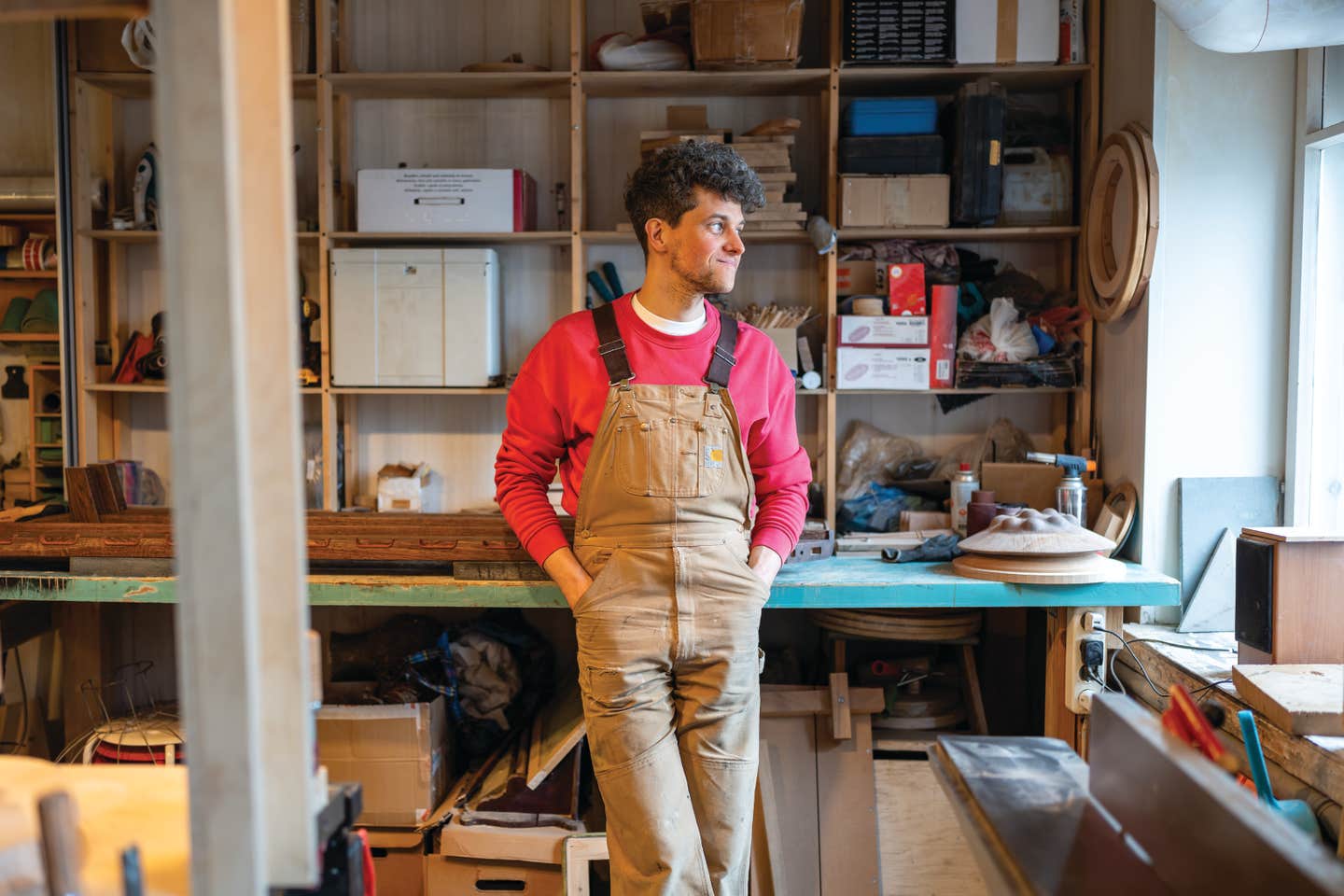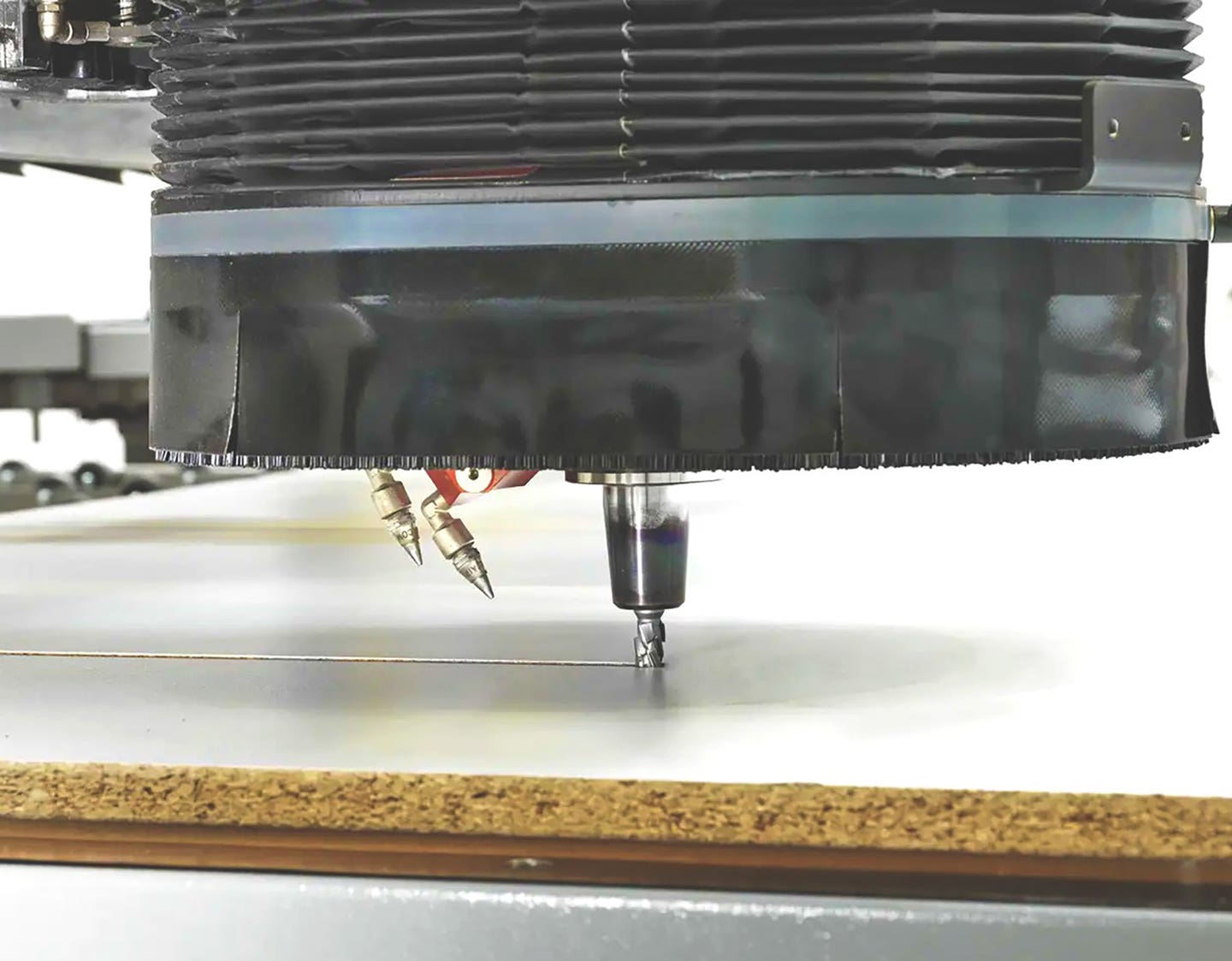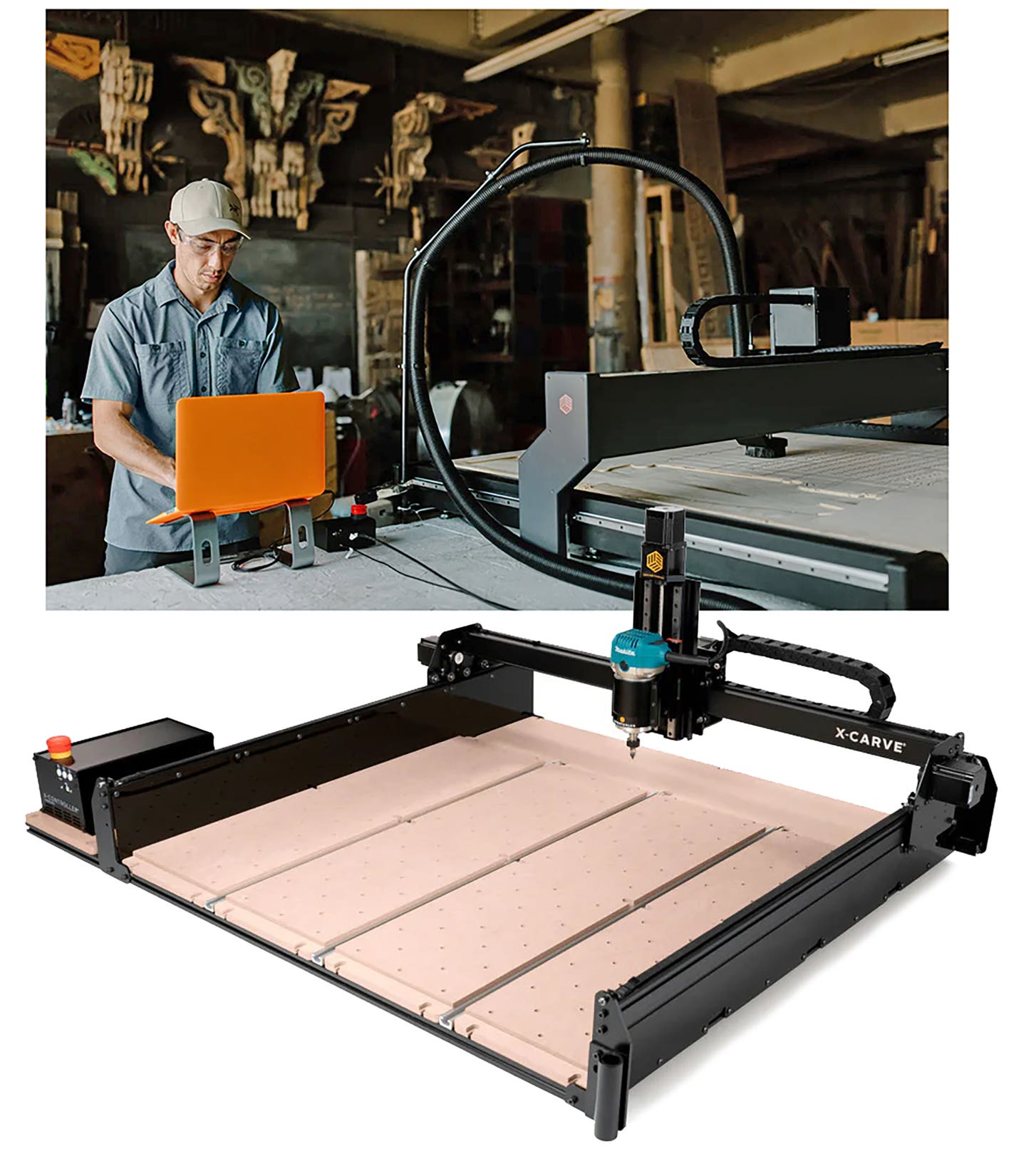Deliberate and dedicated
Usually there is a plan embedded in wood. The exquisite figures — swirls, ribbons, waves — on the face of each board are poised to inspire the design. At least…
Usually there is a plan embedded in wood. The exquisite figures — swirls, ribbons, waves — on the face of each board are poised to inspire the design. At least that’s how Michael Corlis of Corlis Woodworks sees it.
“We’re all about wood — the species, the grain, the color — and honor all its characteristics in everything we build. We study our lumber before we start drawing plans. Our ritual is to head over to our storage building to spend time, sometimes hours, looking through our inventory until the connection is made and we know we have found the right wood.”
And they do have wood, a luxurious array of rare materials tucked away in a quiet valley in West Virginia. The facility, which Corlis Woodworks maintains along with a client who shares its reverence, holds a handsome assortment amassed during years of searching for the highest quality. Thirty-five hundred square feet of kiln-dried, exotic and domestic hardwoods are labeled and stacked neatly in berths all the way to the rafters. The most prominent species used for fine furniture and woodwork are present — true mahogany, quartersawn white oak, sapele, cherry, walnut — awaiting the day when they inspire a new piece by Corlis Woodworks.
The collection represents the Corlis quest for the best material to craft the best designs. Most of the stock is purchased from Irion Lumber in Pennsylvania, a trusted, multi-generational, micro source that specializes in world-class inventory. The company, which respects the rules of sustainable harvesting, keeps wood from one tree together so color, grain and figure can be as closely matched as possible. This practice is essential to Corlis Woodworks. “To find enough matching wood from a single log to craft a piece of furniture is fairly simple, but to do a whole room is very difficult. Today most mills are too busy meeting production numbers to keep their boards together.”
Whenever he can, Corlis catches a falling tree and adds to his own store of hefty finds. In a corner, weighing tons, is a prized contender, an entire rock-hard sugar maple that he scavenged from in front of the Braxton County courthouse. “I could see it would soon be taken down by disease and old age, so I put my name on it for salvage.” Now it’s sawn precisely into slabs and rests in anticipation, positioned to live on as timeless furniture and woodwork.
All for one
To understand how Corlis Woodworks functions, one needs to reveal the personalities. “We’re three different individuals but together in spirit and professional goals. We have our disagreements but there’s mutual respect and trust. Sparks may fly, but we always come together because of our shared principles and passion,” says Corlis from the top spot on the corporate tree.
Corlis, 59, grew up in New Jersey and later attended the University of Maryland’s School of Architecture. Shortly after marrying his college love, he grew dissatisfied with metropolitan life. “I was working for an architect in Annapolis and one day while driving home I sat through a couple of red lights (luckily, traffic happened to be light) thinking about the congestion, frenzied pace, limited interaction with nature and decided I wanted out. I had a friend who raved about The Mountain State, West Virginia, and that’s where we headed.”
Starting a design/construction business was a move he’d been entertaining for quite awhile and, though times were good and opportunity was there, seed money was scarce. Corlis resolved the financial problem by securing a job at the local high school teaching building construction. Then, in 1983, he founded his company and for 28 years divided his time between the classroom and his business, where he held himself responsible for designing and securing projects. Construction and fine woodwork were the main focus until 2003 when a full-time custom furniture and cabinet shop was established in a renovated general store. At that time, Signature Woodworks was added to Corlis Design & Construction. Corlis Woodworks is the abbreviated, all-encompassing moniker.
Corlis developed his basic design philosophy as an architecture student and tuned his senses to the work of Charles and Henry Greene. “In my mind the Greene brothers were the ultimate residential architects because they were craftsmen first, then architects. They took a holistic approach to their work, designing the entire built environment — the furniture, the hardware, the complete house. When you experience one of their houses, you know everything has been considered and is in harmony, including the material, the craft, the proportion. We love their celebration of material and craftsmanship.”
Michael Moore, vice president and co-owner, is the technology expert who also helps direct the six-man field crew. Corlis drafted him soon after Moore graduated from his building construction class and gives him high marks. “Michael was one of my best students, got almost perfect scores on all the tests. I couldn’t have found a better partner and right-hand man.” Moore spends most of his time in a satellite office turning out all the shop drawings on a variety of CAD-related platforms: ArchiCAD, Google SketchUp and Cabinet Vision.
Scott Todd runs the shop and is one of the main reasons the full-time shop could be opened in 2003. He’s a self-taught woodworker (and says he’s still learning) and projects the image of a true artisan right down to the tan leather apron. He joined Corlis in the early 1990s after stints in satellite TV sales, logging and carpentry.
Todd’s personal goals and habits are tailor-made for Corlis Woodworks. Corlis says, “He’s obsessively organized and totally dedicated to the craft of woodworking.” Making furniture is Todd’s passion and he holds fast to his place in the business where “I get paid to do what I love to do.” He loves everything — except the sanding. “I sand everything to 220 grit and finer. It takes a lot of time and patience and it’s hard on the knuckles, but necessary to get a polished, glass-smooth result. Our new high-tech Voorwood A117 shaper/sander helps take away a lot of the pain.”
Putting the wood to work
“Once Scott and I have selected the right material, we simply honor the wood and let it make the statement, believing that each piece has a purpose,” says Corlis. The “statement” is never lost in translation and that, along with their unwavering attention to detail, is what makes a Corlis Woodworks job easy to spot.
A current project is an example of commitment to their design and craftsmanship philosophy — a dining room suite consisting of eight chairs, table and sideboard. The ensemble will be built one detail at a time in about six months and will be presented by their client as a Thanksgiving wedding gift. The chairs, now in assembly mode, were designed by Corlis, converted into plans by Moore and crafted by Todd. They can be described as sturdy elegance, contoured perfectly to provide ideal seating comfort, and are structurally and aesthetically identical.
In the beginning there were 4” slabs of extremely dense quartersawn mahogany from one log. As the men progress to the table and sideboard, they’ll resaw the slabs and book-match the large surfaces. Each piece will appear as melded works of art even before they’re finished and buffed.
The entire set, priced around $35,000, will get six coats of wipe-on polyurethane, meticulously applied by Todd. “We like to let the wood’s innate personality shine through,” says Corlis. “If a customer wants a certain hue, we search for a wood that projects the color they like so we can finish it naturally. No stains, no color enhancements, no veneers.”
Good tools, both hand and power, are obviously an important feature of this shop. The shop’s 3,500 square feet are taken up with a full range of saws and sanders, some of which were purchased after trips to the AWFS fair. “It’s at shows like that where you have a chance to see different makes and models displayed together so you can compare them,” says Todd. “We don’t buy everything new, though. We have several power tools — our Oliver spiralhead planer, Northfield 24” jointer and a Wysong & Miles hollow mortise chisel — we bought used and restored. We believe the older equipment is heavier, better built and produces truer, cleaner cuts.”
Detail matters
The majority of the company’s projects mandate on-site work solutions. “Being located in a rural area poses a lot of problems when the job is a long way from the shop,” says Moore. “You can’t forget tools or supplies because you waste time and money going back to get them. Obviously, checklists and doing pre-visits to the sites to get accurate measurements are really important. Sometimes we can anticipate variance in dimensions and build them into our bid.”
The Kommor house built in 1988 in Charleston, an award-winning contemporary home featured in Fine Homebuilding (Issue No. 75), tested their stamina. Prominent were its oak trusses built on site and richly finished to a natural luster. Corlis notes that “the trusses weren’t a problem, though it took a lot of mutual effort with the architect to work out the issues. The more difficult challenge was positioning clerestory awning windows right up against the ceiling in all the major rooms. This meant the normal place for the header, which takes the roof load and carries it over the windows, was eliminated. We had to build the headers into the flat roof framing system, invisible on the interior.”
The owners were satisfied with the outcome, as they have commissioned Corlis Woodworks to design and build a screen porch addition. The porch will be constructed using the same open, flat chord trusses with LED lighting in the bottom chords to light up the ceiling.
The company also built the Artisan House at the Greenbrier Sporting Club in White Sulphur Springs, W.Va., in 2006, which echoes the Greene brothers’ artisanship in their “ultimate bungalows.” “I believe this represents our absolute best work,” says Corlis. “We designed the entire interior and it is built like a piece of furniture.”
The home’s striking exterior of cedar and granite is graced with a cedar shake roof. The interior is an amalgam of beautiful wood and fine architectural details. The company’s talents are enshrined in the coordinated look created by sequential boards and perfectly book-matched surfaces. Corlis Woodworks’ technique of resawing highly figured panels and framing them with straight grain was also employed throughout the home and is especially evident on the 22 doors.
In the Artisan kitchen, the hand-cut raised dovetails on the crotch mahogany range hood and drawers are a Corlis signature highlight. In addition to the unique structural points, unusual wood-like beeswing figure mahogany were used to enhance the dramatic overall effect. Handmade wood and brass refrigerator handles and a cast art glass screen for the master shower typify the home’s exceptional elements.
As he strives to combine art and architecture, Corlis is committed to supporting local talent. He has called on a number of West Virginia’s accomplished craftsmen and artists, including blacksmith Jeff Fetty (www.jefffetty.com), artist Bill Hopen (www.billhopen.com) and others whose work may not be as familiar but add a notable character to every project.
Corlis’ mission to bring out the best in wood inspires testimonials from his colleagues. Mark McConnell, an architect whom he met on a project at the Greenbrier Resort, says, “Michael is my go-to person whenever I have a question about wood. He’s an expert, a connoisseur. Any opportunity I have to work with Michael, I’ll take. I know the job will be done right every time. He absolutely will not compromise on the wood he uses and on perfect workmanship. He’s always thinking about the wood.”
Hiring and branching out
Corlis must now confront two pressing challenges, the first of which is searching for new employees for the shop. “We’re always looking for qualified people with a strong work ethic and a willingness to learn and stick to our principles.” You needn’t wear an apron, but you do have to don uncompromised commitment to old-school craftsmanship and sound woodworking techniques without cutting corners. The shop keeps a four-day, 10-hour workweek; if you tend to watch a clock, this probably isn’t the place for you.
His second most important order of business is “finding a larger market for our niche. Since I retired from teaching in the spring of 2011, I can spend more time finding new clients for our company.” Corlis Woodworks enjoys no real competition in the area and could probably be in line for more business, but the quest for perfection sometimes makes it harder to win bids. Corlis’s strict operating principles, which he will not compromise, take time — time most can’t spare or aren’t willing to grant him.
However, it is because of his high standards that the company has a loyal following, a circle of repeat clients and respected colleagues. But Corlis realizes that reliable customers wear thin over time and it becomes necessary to continually find new sources of business.
Advertising is currently done online and at two yearly expositions: the Charleston Home Builders Show and West Virginia Expo. The company’s résumé includes close to 50 awards from state and local homebuilders that help boost its credibility. Most projects are scattered within a 100-mile radius of the shop, which includes the capitol of Charleston. From now on, the push will probably be toward Washington, D.C., New York and other metropolitan areas.
“We aim to provide the highest quality old-school craftsmanship we are allowed to do and still stay in business. We’re part of the last of a breed and we’ll keep fighting for what we believe in,” adds Corlis.
Now if only his wood could lend a vibrant voice to the cause.
Contact: Corlis Design & Construction Inc. and Signature Woodworks, Route 1, Box 50, Frametown, WV 26623. Tel: 304-364-2687. www.corliswoodworks.com or www.corlisdesign.com
This article originally appeared in the November 2011 issue.







